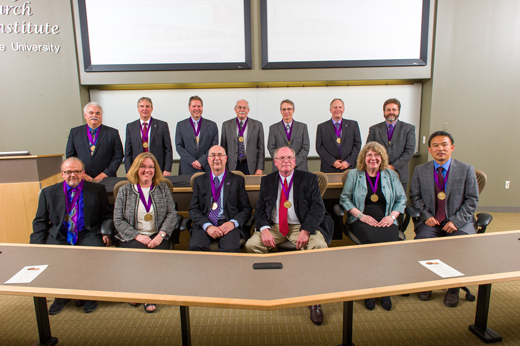May 4, 2016
Biosecurity Research Institute awards research fellowships

The Biosecurity Research Institute, or BRI, presented awards to 13 researchers as inaugural members of the Marty Vanier and Bob Krause BRI Research Fellows Program at a ceremony and reception on April 29. The purpose of the program is to foster interdisciplinary research and educational opportunities and activities associated with the work the fellows are doing in areas such as high-consequence plant and animal diseases, foodborne disease agents, arthropod-borne diseases, and pathogens that can be passed from animals to humans.
"I am thankful for Marty and Bob's gift so we can recognize the amazing work our researchers are doing," said Peter Dorhout, vice president for research at Kansas State University. "The fellows will work with the staff at the BRI to establish a seminar series and other opportunities to inform our community of ongoing work and emerging opportunities as we build a bridge to the National Bio and Agro-Defense Facility."
The following individuals were recognized as BRI Research Fellows:
- William Bockus, professor of plant pathology.
- Kenneth R. Burton, program director of the National Agricultural Biosecurity Center.
- Steven Eckels, professor of mechanical and nuclear engineering.
- Stephen Higgs, associate vice president for research and research director at the Biosecurity Research Institute.
- David Scott McVey, research leader and supervisory veterinary medical officer, U.S. Department of Agriculture's Agricultural Research Service, Arthropod-Borne Animal Diseases Research.
- Randall K. Phebus, professor of animal sciences and industry.
- Juergen A. Richt, Regents distinguished professor of diagnostic medicine and pathobiology.
- Raymond "Bob" Rowland, professor of diagnostic medicine and pathobiology.
- Jishu Shi, professor of anatomy and physiology.
- James P. Stack, professor of plant pathology.
- Barbara Valent, university distinguished professor of plant pathology.
- Dana L. Vanlandingham, assistant professor of diagnostic medicine and pathobiology.
- William C. Wilson, research microbiologist, U.S. Department of Agriculture's Agricultural Research Service, Arthropod-Borne Animal Diseases Research.
Stephen Higgs appreciates the award as both a recipient and as director of the Biosecurity Research Institute.
"The establishment of this program has enabled us to recognize principle investigators ongoing projects at the BRI," Higgs said. "These awards acknowledge not only that the BRI Fellows have brought significant funding to K-State, but also that their work is impactful."
Higgs added that the Biosecurity Research Institute provides unique interdisciplinary and collaborative opportunities to conduct research that is not possible anywhere else on campus or at most other academic institutions. Formalizing the relationship of faculty with the Biosecurity Research Institute together with providing doctoral fellowships and endowed professorships will help promote the importance of the Biosecurity Research Institute as a premier interdisciplinary research, training and education facility. Higgs also noted that the program wouldn't have been possible without Marty Vanier and Bob Krause's gift.
"The generosity, commitment and impact of Marty and Bob to support our mission cannot be underestimated," Higgs said. "The joy of translating this endowment into an enduring program with high impact is obviously tempered by Bob's untimely passing, but I know that what we are doing would make him proud and give him immense satisfaction."
The awards were presented at the conclusion of a meeting of the BRI's external advisory board. Members of the board provide national and international perspectives on research opportunities that will advance the BRI mission, including those presented by the NBAF.
"Researchers at BRI are already studying prominent pathogens proposed for NBAF, and they're making progress on vaccines against diseases that threaten animal and human health," said Dorhout.
"This program will help ensure K-State's progress in these areas continues," he said.
Philanthropic contributions to K-State are coordinated by the Kansas State University Foundation. The KSU Foundation was established in 1944 as the official fundraising arm of Kansas State University. It is a separate, independent entity chartered by the state of Kansas as a 501(c)(3) nonprofit education corporation. The foundation is leading Innovation and Inspiration: The Campaign for Kansas State University to raise $1 billion for student success, faculty development, facility enhancement and programmatic success.
